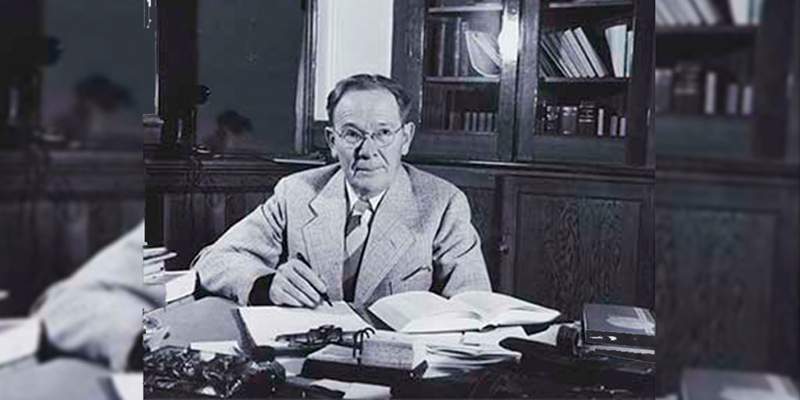Biography of Lewis Terman (1877-1956)

- 3201
- 771
- Hugh Greenholt
Lewis Terman's biography is as interesting as controversial, especially for his creation of the intelligence test with which he measured the intellectual quotient (CI). Terman combined his knowledge of psychology and education to work in an objective similar to a social reorganization, in which each individual would occupy the place that corresponded to him. For it, It was intended to divide the gifted children of those who do not. Of course, this is now very controversial; However, this thinker has several interesting points for analyzing.
Content
Toggle- Lewis Terman, a man with great aspirations
- Lewis Terman's ideas and Darwinism
- Lewis Terman and Henry Cowell's story
- Biography
Lewis Terman, a man with great aspirations
Lewis Terman's huge aspirations did not seem to fit in his native Johnson County, Indiana, where he was born in 1877. Maybe that is why His thought came so far that today he is approached in almost all universities in the same way that it is discussed. This remarkable American psychologist studied at the Central Normal College, in Indiana, as well as psychology in the same county, specifically at Clark University. For the year 1905 he already had the race approved.
From then on, Lewis Terman began to teach psychology and pedagogy classes, and in 1910 he began his career as an education professor at Stanford University. Thanks to Lewis Terman today we know the concept of intellectual quotient (CI), applicable in many tests to measure intelligence both in children and adults. Terman devised this test after examining the tests proposed by Alfred Binet and Théodore Simon.
One of Terman's most cited works is The genetic study of genius, which consists of a deep analysis that he performed taking 1500 children considered gifted intelligence. The publication of this work is condensed in five volumes that saw light after their death. Today is considered an important work, since Some instruments to measure intelligence did not exist until after the 19th century, Well, prior to this there were no precise resources to do so; In the first place, because it was believed that the brain was related to a little objective concept, the soul.
Secondly, in the nineteenth century investigations were also scarce because Studies in neuropsychology were not advanced. However, little by little some authors, such as Galton, began with their contributions to psychometry, taking as impulse the naturalist ideas of Charles Darwin. Now, why have Lewis Terman's contributions been so controversial since he proposed such a widely used term?
Lewis Terman's ideas and Darwinism
One of the reasons why Lewis Terman's ideas have been criticized, has been the link they keep with Darwin's theories. Well, as the pH points out.D., Laura López, in her study on the origins of the concept of intelligence, many of the approaches on social Darwinism and biological determinism were defended by those who promoted intelligence tests.
In the case of Terman, he proposed a very attractive simplification to measure intelligence and, although some authors - as Binet himself - opposed that intelligence was much more complex, in the end, The Terman's proposal on divide the IC won more acceptance. It is worth noting that, Lewis Terman was serving the United States Army for a while. Its function was to apply intelligence test to recruit.
After this experience, Terman pressed that the tests were taken to schools, apply it to children and predict which would be most successful, measuring your IC. Those who did not get a high score would be the least ideal candidates to go to universities, so the idea was to reorient their lives towards other trades. Therefore, many people have considered that Lewis Terman's proposal was discriminatory. On some occasions, Terman came to qualify those who had presented their evidence as poor.
 Biography of Irvin Yalom (1931)
Biography of Irvin Yalom (1931) Lewis Terman and Henry Cowell's story
Analyzing the biography of Lewis Terman also leads to the life of the remarkable composer, pianist, professor, musical theorist and businessman Henry Cowell, since, Cowell was discovered by Terman! Cowell was the son of separate parents since childhood at home, he lived in a rural area. The social possibilities that Cowell had to excel were not on his side.
Cowell's jobs were very humble, but he had to do it because his mother, an anarchist writer, was sick. However, the life of the young Cowell changed radically when Terman noticed that this boy, after finishing his workday, was going to play piano and did it in a prodigious way. The support that Terman gave Cowell allowed the young man to continue his university career and formally study the musician's career.
This brief review of Lewis Terman's biography only allows us to affirm that, although his ideas have been very discussed today, He created a test that cannot be dismissed so easy in the history of psychometry, nor can the concept of intellectual coefficient be so easily banished.
Biography of Robert Sternberg (1949)
Biography
- Jolly, J. L. (2008). Historical Perspectives: Lewis Terman: Genetic Study of Genius-elementary School Students. Gifted Child Today, 31(1), 27-33.
- López González, L. (2013). The origins of the concept of intelligence II: the birth of intelligence psychometry.
- Terman, l. M. (1947). Genetic Studies of Genius, 4 vols. Vol. I, Mental and Physical Traits of One Thousand Gifted Children, 1925; Vol. II, The Early Mental Traits of Three Hundred Geniuses, 1926; Vol. III, The Promise of Youth, 1930; Vol. IV, The Gifted Child Grows Up, 1947.
- Vialle, w. (1994). "Termanal" Science? The Work of Lewis Terman Reviewed. Roeper Review, 17(1), 32-38.

